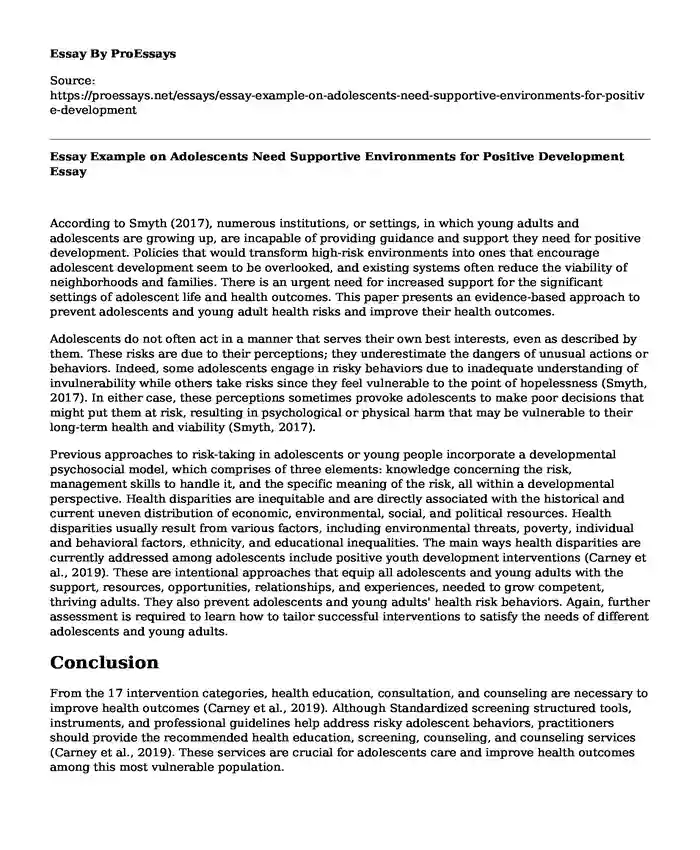According to Smyth (2017), numerous institutions, or settings, in which young adults and adolescents are growing up, are incapable of providing guidance and support they need for positive development. Policies that would transform high-risk environments into ones that encourage adolescent development seem to be overlooked, and existing systems often reduce the viability of neighborhoods and families. There is an urgent need for increased support for the significant settings of adolescent life and health outcomes. This paper presents an evidence-based approach to prevent adolescents and young adult health risks and improve their health outcomes.
Adolescents do not often act in a manner that serves their own best interests, even as described by them. These risks are due to their perceptions; they underestimate the dangers of unusual actions or behaviors. Indeed, some adolescents engage in risky behaviors due to inadequate understanding of invulnerability while others take risks since they feel vulnerable to the point of hopelessness (Smyth, 2017). In either case, these perceptions sometimes provoke adolescents to make poor decisions that might put them at risk, resulting in psychological or physical harm that may be vulnerable to their long-term health and viability (Smyth, 2017).
Previous approaches to risk-taking in adolescents or young people incorporate a developmental psychosocial model, which comprises of three elements: knowledge concerning the risk, management skills to handle it, and the specific meaning of the risk, all within a developmental perspective. Health disparities are inequitable and are directly associated with the historical and current uneven distribution of economic, environmental, social, and political resources. Health disparities usually result from various factors, including environmental threats, poverty, individual and behavioral factors, ethnicity, and educational inequalities. The main ways health disparities are currently addressed among adolescents include positive youth development interventions (Carney et al., 2019). These are intentional approaches that equip all adolescents and young adults with the support, resources, opportunities, relationships, and experiences, needed to grow competent, thriving adults. They also prevent adolescents and young adults' health risk behaviors. Again, further assessment is required to learn how to tailor successful interventions to satisfy the needs of different adolescents and young adults.
Conclusion
From the 17 intervention categories, health education, consultation, and counseling are necessary to improve health outcomes (Carney et al., 2019). Although Standardized screening structured tools, instruments, and professional guidelines help address risky adolescent behaviors, practitioners should provide the recommended health education, screening, counseling, and counseling services (Carney et al., 2019). These services are crucial for adolescents care and improve health outcomes among this most vulnerable population.
References
Smyth, P. (2017). Working with high-risk youth: A relationship-based practice framework. Taylor & Francis. https://doi.org/10.4324/9781315270043
Carney, T., Chimbambo, V., Johnson, K., Louw, J., & Myers, B. (2019). The adaptation of an evidence-based brief intervention for substance-using adolescents and their caregivers. Psychotherapy Research, 1-11. https://doi.org/10.1080/10503307.2019.1656352
Cite this page
Essay Example on Adolescents Need Supportive Environments for Positive Development. (2023, Sep 10). Retrieved from https://proessays.net/essays/essay-example-on-adolescents-need-supportive-environments-for-positive-development
If you are the original author of this essay and no longer wish to have it published on the ProEssays website, please click below to request its removal:
- Paper Example on Mental Disorders
- Why Colleges Shower Their Student's With A's? - Essay Sample
- Essay Example on Inclusive Education: Philosophy of Exceptional Learning
- Essay on Benefits of Childhood Play
- Teaching Literature: Exploring Pedagogy for Effective Learning - Essay Sample
- Paper Sample on Achieving Academic Success: My Journey to Higher Education & Certifications
- Authentic Praxis Engagement Paper Example







